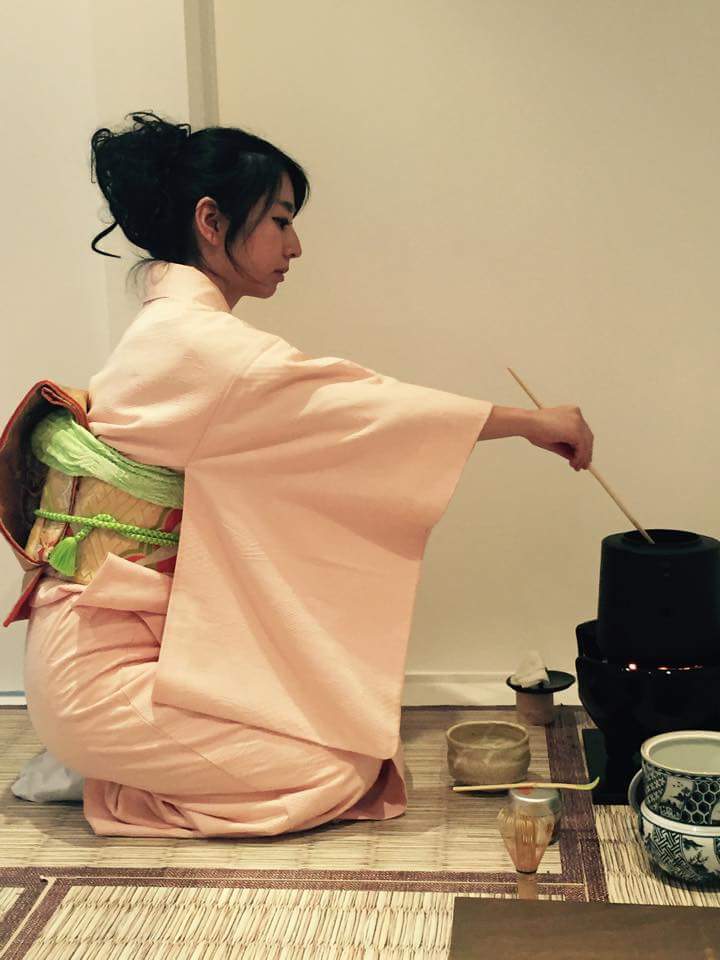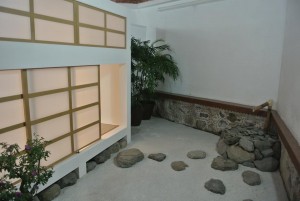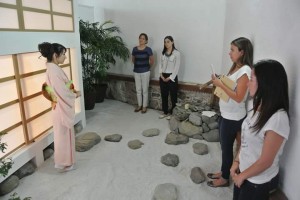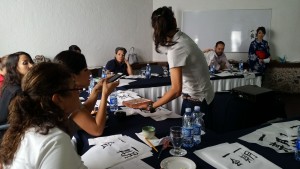22 oct 2015
(English text will follow)
Nous avons eu la chance d’offrir un atelier de cérémonie de thé japonaise à un groupe d’amateurs de thé japonais à Cocoyoc au Mexique en collaboration avec l’Escuela Mexicana de Té.
Un salon de thé avec un petit jardin avait été construit pour donner aux participants la chance de vivre une vraie cérémonie de thé japonaise.
Les participants ont appris la bonne étiquette avant et pendant la cérémonie de thé, la manière d’entrer dans le salon ainsi que les étapes de la cérémonie.
La cérémonie commence par la purification de chaque ustensile. On procède ensuite à la préparation du Matcha, puis on termine avec le nettoyage des ustensiles. Lors de la cérémonie, les participants se voient offrir des sucreries et leurs bols de thé de manière traditionnellement japonaise par notre associée.
C’était également une opportunité d’apprendre la philosophie Zen Ichigo Ichie (une rencontre, une opportunité). Selon le mode de pensée Ichigo Ichie, il faut apprécier la présence de chaque invité, des ustensiles utilisés, de la saveur du Matcha, de la température de l’eau, de la calligraphie, des fleurs, des sucreries, etc. parce que ces choses et ces moments lors de chaque cérémonie de thé sont uniques et ne se reproduiront plus. Ce concept s’applique donc aussi à la vie quotidienne et nous apprend à apprécier le moment présent et tout ce qui nous entoure. Le “présent” est un temps du verbe, mais il nous rappelle aussi la présence des “ petits cadeaux de la vie, incluant les personnes et les choses”.
Dans chaque cérémonie, nous avons utilisé des bols à thé faits à la main au Mexique pour vraiment profiter du mélange culturel entre ces deux pays.
Il faisait chaud à Cocoyoc mais il faisait encore plus chaud dans le salon à cause de l’eau chaude et du grand nombre de gens dans un petit espace, mais tous les participants étaient quand même très satisfaits de cette expérience.
Dans d’autres salles, l’équipe de l’Escuela Mexicana de Té offrait un atelier sur le Matcha: son histoire, une comparaison des différentes qualités de thé et une explication du mode de préparation du Matcha. L’autre équipe faisait une présentation sur plusieurs sortes de thé vert de notre plantation au Japon: Fukamushi, Kona-cha, Sencha et Gyokuro.
Le deuxième jour, nous avons organisé une présentation et un atelier sur la culture japonaise. Nous avons parlé de l’origami, de la calligraphie, des sucreries japonaises et d’autres sortes de thé vert: Genmai-cha, Hoji-cha avec Genmai, Hoji-cha et Genmai-cha avec Matcha.
Nous avons terminé notre atelier par une dégustation de confiture au Matcha avec un pain Mexicain nommé Concha à saveur de Matcha.
Nous remercions tous les participants d’être venus et d’avoir partagé cette expérience magnifique avec nous. De plus, cet atelier de thé de deux jours n’aurait pas été un si grand succès sans l’aide de l’Escuela Mexicana de Té qui nous a aidés à mettre sur pied ce projet.
22 oct 2015
We were given an opportunity to offer a Japanese tea ceremony workshop to a group of Japanese tea lovers in Cocoyoc, Mexico in collaboration with the Escuela Mexicana de Té.
A tea room with a little garden was built to allow the participants to experience a real Japanese tea ceremony.
The participants were able to learn the correct etiquette before and during the tea ceremony, the right way to enter the room and the steps of the ceremony.
We started with the purification of each utensil, then followed with the preparation of the Matcha and ended with the cleaning of the utensils. The participants were given sweets and bowls of tea in the traditional Japanese manner by our associate.
It was also an opportunity to learn the Zen philosophy of Ichigo Ichie (one encounter, one opportunity). According to Ichigo Ichie, the presence of each guest, each tea utensil we used, the flavour of the Matcha, the temperature of the water, the calligraphy, the flowers, the sweets, etc. must all be appreciated because each specific moment during each tea ceremony only happens once and will never reoccur. The concept of Ichigo Ichie thus also applies to daily life and teaches us to appreciate the present moment and everything we have around us. Though the “present” is a verb tense, it also refers to these ‘little gifts of life, which include people and things.”
In each ceremony we performed, we used tea bowls hand made in Mexico for a truly culturally diverse experience.
In other rooms, other members of the Escuela Mexicana de Té were conducting a Matcha workshop where they talked about the history of Matcha, compared different qualities of Matcha and explained how to prepare Matcha. Other members gave a presentation about different types of green tea from our plantation: Fukamushi-cha, Kona-cha, Sencha and Gyokuro.
On the second day, we organized a presentation and a workshop about Japanese culture. We talked about origami, calligraphy, Japanese sweets and other types of green tea: Genmai-cha, Hoji-cha with Genmai, Hoji-cha and Genmai-cha with Matcha.
.
The workshop ended with a tasting of a delicious Matcha spread along with a Matcha flavoured Mexican pastry called Concha.
Our appreciation goes out to the participants who came and shared such a great experience with us. Many thanks also to the Escuela Mexicana de Té for making this two day workshop a great success.









